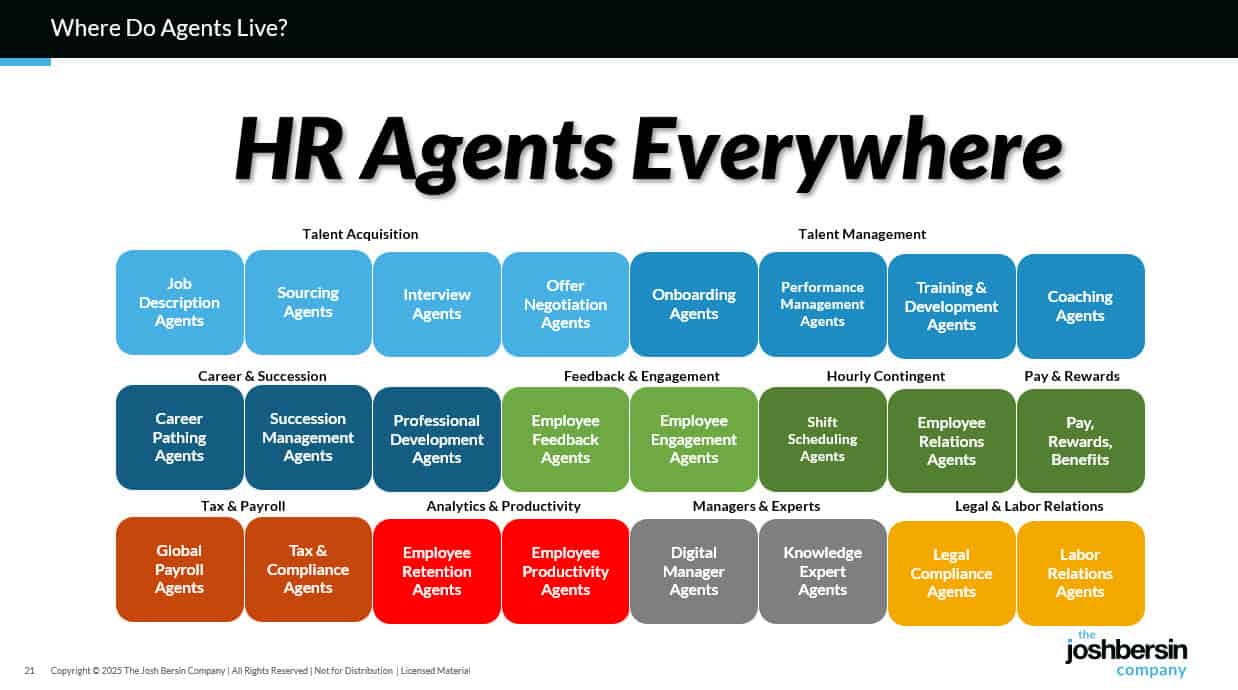I adore the human resources profession. These folks are responsible for hiring, development, leadership development, and some of the most important issues in business. And despite the history of HR being considered a compliance function, the role is more important than ever. CHRO salaries, for example, have increased at 5-times the rate of CEO pay over the last twenty years, demonstrating how essential HR has become.
That said, we have to be honest that AI is going to disrupt our role. This week IBM formally announced that 94% of typical HR questions are now answered by its AI agent, and the role of HR Business Partner is all but eliminated except for very senior leaders. As a result the CEO plans to reduce HR headcount and shift that budget towards sales and engineering.
Let’s accept the fact that we are in a time of increasing acceleration. In other words, the capabilities of AI are growing much faster than our organizations” ability to adapt, so we have to lean forward and start redesigning our companies. In the case of HR, our Systemic HR model (which we launched two years ago) is now being fully automated by AI.
I know IBM’s story well, and I think it explains where all HR teams are going. Many years ago Diane Gherson (prior CHRO) started AI projects to automate recruitment, pay analysis, and performance management. She spoke at our conference eight years ago and shared how IBM’s pay tool (CogniPay was launched in 2018) uses AI to make pay recommendations based on skill. This type of tool, which was years ahead of the “skills-based” strategies we see today, essentially automated many of the performance and pay decisions left to managers.
Since then IBM has gone much further, and in my last conversation with Nickle Lamoureux (current CHRO) she told me the AI agent helps write performance reviews, creates development plans, and coaches managers and senior leaders on a myriad of performance based decisions. I totally believe this because I see Galileo doing these kinds of things for companies every day. (Check out the Mercury release.)
How does this impact the roles and jobs in HR? Well it definitely eliminates many.
In the case of L&D or HR business partners, I believe we could see a 20-30% or more reduction in HR headcount per employee. And that means these individuals may wind up managing the AI platforms, moving into roles as change consultants (which AI still can’t do), or move into areas like org design, learning architect, and data management.
I think this is all a good thing. While we all worry about AI taking our jobs, we have to remember that our real job is not to “do things” but to “add value” and bring complex problem solving skills to our companies. And in this journey to “crawl up the value curve,” we all have to learn to use AI, develop AI solutions, and think more systemically about how our companies go to market.
I recently interviewed a brilliant HR leader (podcast coming) at WPP who explained how he and his team rationalized their job architecture from 65,000 job titles to only 600 by using new AI tools from OpenAI and Reejig (a work intelligence vendor). As you’ll hear in his story, this effort was a combination of data management, business analysis, change management, and leadership. The results of this work, which are still ongoing, is the opportunity for WPP to dramatically change its go to market strategy, innovation, and growth.
That’s the kind of thing we want our HR teams to do.
And as these various agents hit the market (see my latest view of the market below), HR professionals are going to have to train them, implement them, and “manage them” for long term success. This means analyzing the cross-functional data they produce, extend them into better decision-making, and move our thinking from dated concepts like “time to hire” and “course completion rates” to meaningful measures like “time to revenue” or “time to productivity” or “time to customer service excellence.”
 |
See where I’m going? In a time of increasing technology acceleration we have to “lean in” as hard as we can.
Stop thinking about how much money we save on headcount (which is a fleeting benefit, by the way) and focus on value creation. That’s the big benefit of AI: customer service quality, time to market, and innovation.
In many ways these “HR downsizing” stories are really stores of “HR crawling up the value curve,” which is really a good thing. And for HR professionals, it’s a time for personal reinvention.
(This week at Irresistible 2025 we’re going to show you a whole new approach to employee and leadership enablement, driven by Galileo – so stay tuned!)
Additional Information
The White Collar Recession Is Real: What Should We Do About It?
The Rise of the Superworker: Reinventing Jobs, Careers, and Organizations
The HR Career Navigator
Join The Josh Bersin Academy











